My father: Prakash Mathur - a pictorial tribute
Editor's Note: This is a tribute to Shri Prakash Chand Mathur (1940–2015). Known to family as 'Titi' and friends as 'PC', his birth anniversary falls on June 10. His daughter, along with the rest of his family, remember him pictorially.
- Sfoorti Mathur, daughter
- Meenakshi Hooja, younger sister
- Gaurav Mathur, nephew
- Ashok Mathur, younger brother
- Subodh Mathur, younger brother
- Rakshat Hooja, nephew
- Parul Mathur, niece
Sfoorti Mathur, daughter

Sfoorti Mathur is a communication designer working with a variety of lifestyle brands. She enjoys cooking and travel photography. She lives in Jaipur with her mother Shashi, and pet Sushi.
My Father: Prakash Mathur
I have always been shy writing about my father. It’s a huge challenge to write about a man who had a lot to tell.
Being one of the youngest in the family, I was always pampered by everyone especially my father. He believed in me more than I did in myself. Post my schooling, I wanted to go out of Jaipur to study design. It was with his support and confidence in me that I was able to fulfill my dream. He was my ‘go to’ person for everything.
Not many people know this, but my father was always keen to try out new things. Once he allowed me to give him a Frenchie beard which became a big hit and, later on, a part of his regular look. Once I persuaded him to try out a pedicure at a Spa which he enjoyed so immensely that he promised to get it done again.
My father taught me most of my important life lessons. And if I could become even a fraction of what an amazing person he was I would be the happiest.
Photo Collage #1: The Early Days
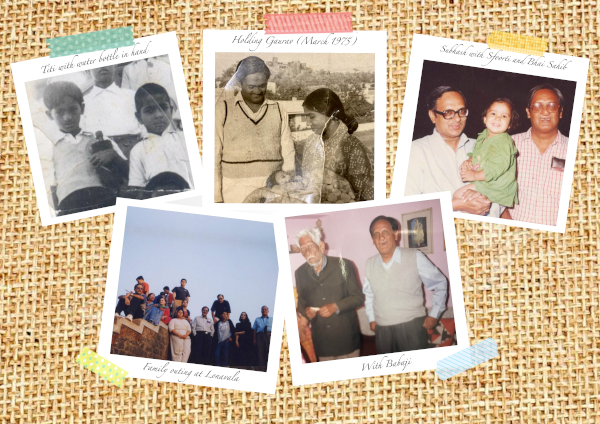
P. C. Mathur: the early days
Meenakshi Hooja, younger sister

Meenakshi Hooja is an IAS officer who has served in both Government of India and Government of Rajasthan. She is a published poet in both English and Hindi. She has authored books on Panchayati Raj and tribal development. She was a visiting fellow at Queen Elizabeth House, University of Oxford (U.K.).
Titi and the Academic world
When I went to attend a Seminar on Public Administration in the University of Kurukshetra in May 2019, little did I expect that in a way the Seminar would be completely dedicated to my eldest brother Titi, fondly called PC Sahib or simply PC by his friends and academic colleagues.
Distinguished speaker after speaker, including Prof Rajesh Kumar, Prof Neelima Deshmukh and many others recalled his intellectual and writing abilities, and the new dimensions he would add to the subject, be it Public Administration, Political Science or any other domain, in his inimitable and unconventional yet convincing style.
Similar has been the response in many other institutions like the lecture series at Gandhi Bhawan, seminars and meetings in the University of Rajasthan, Central University, Ajmer. Prof Rajesh Gupta, Prof Ambedkar and many others always refer to his brilliance and unique personal touch.
In the Indian Institute of Public Administration ( IIPA ), of which he was a very active life member, Titi was a proud recipient of the award for the best essay as far back as in the early 1960s from PM Jawaharlal Nehru himself.
Titi’s persona is always remembered by so many at the AGMs and other Conferences. Shri TN Chaturvedi, Chairman IIPA, always spoke very highly about him in various meetings, including the Rakesh Hooja Memorial lectures. Apart from this all the people I meet from the University of Rajasthan and in Udaipur, Jodhpur, Kota including the Vice Chancellors like Prof Kanta Ahuja, Prof Bareth, Prof Dadhich, often remember and miss him and wish he was still around to to guide them as he had done for so many decades.
A person so much admired and appreciated and missed in academic and educational forums and circles undeniably must be having unusual qualities of head and heart. And that is true of Titi in every way.
He was extremely affectionate, caring, innovative, helpful and believed in the principle of doing good to others, no matter what the consequences. His wide array of body of work captured in books and papers lives on in the academic world.
His ways of living endeared him to one and all. A separate fridge for water, eating rice and chapatti together, always having dahi with sugar, putting a cup of tea on his tummy using it as a table top, lending a helping hand at family ‘shaadis‘, finding the most appropriate gifts for birthdays - Titi was a total family person as well as an outstanding professional.
We can now follow his legacy to remember him and to improve our lives.
Gaurav Mathur, nephew

Gaurav Mathur lives in Ahmedabad with his wife, Poonam, and son, Saksham. He practises law. He studied at Kendriya Vidyalaya No.1, Shahibaug, Ahmedabad from 1987 to 1992, after which he did his graduation in BA (Hons.) Economics from University of Rajasthan and law from Maharani Laxmi Bai Arts and Commerce College, Gwalior.
Remembering Titi Tauji
How should I describe a man who was equally at ease with political science, philosophy, public administration, Panchayati raj, quantum physics and cricket! That he had a disdain for money yet loved good things in life. That he was a thorough family man and yet passionately individualistic. That ‘oxymoron’ was his favourite term, after ‘Arey Shashi’ (his wife) and ‘Foorti’ (his daughter).
P. C. Mathur, Titi Tauji to my generation continues to be gentle giant, who never allowed his shortcomings to derail his quest for knowledge. He cherished family reunions, could be happy as a child, treasured grandchildren and yet reveled in an argument. His hunger for knowledge and willingness to spread it was unprecedented.
I spent two nights at the hospital with him when he was suspected to carry a malignancy (which never was there). He spoke to me all night, much to the discomfort of his neighbour and described political theory right from Socrates’ dialogue with Crito to modern political thought. Quite literally, I lent him my ears but the learning wasn’t gratuitous. I would have to call for tea and secretively share it with him through the night!
He very fondly recalled that the invitation of my marriage with Poonam had gone out in his and Shashi Taiji’s name. It was a powerful memory deeply embedded but recalled that night effortlessly.
His engagements stood the test of time, be it friends, detractors or admirers. All in veneration of the insight and vastness he had on the topic.
Only one description, I believe, befits Titi Tauji’s stature. Institution. Institutions are cherished, revered and as I do, unfailingly each day, celebrated.
Photo Collage #2: Anniversary
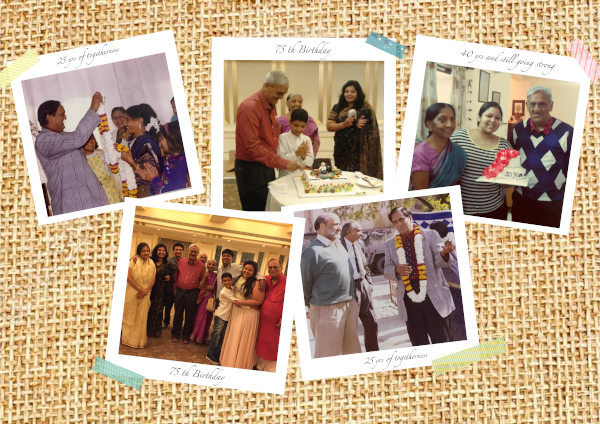
P. C. Mathur: anniversary
Ashok Mathur, younger brother

Ashok Mathur lives in Pune with his wife, Pamela. He studied at St. Xavier's School, Jaipur, after which he did his graduation in B.Sc. (Hons.) Physics from Maharaja's College, Jaipur in 1969 and MBA (Finance) from IIM, Ahemdabad in 1971.
My Brother Titi, as I knew him
Titi’s vast erudition had a simple secret; what he learnt once to never to forget. Except for Chemistry, which he had learnt at college, perhaps from ordinary teachers in an empirical manner?
Everything else he could recall at will during any impromptu discussion. He never spoke about chemistry.
I am ten years younger to him. While I was studying in the B. Sc. final year, he had already got the book “Strange Story of The Quantum“ (Banesh Hoffmann, 1947) and read it. During that time when I got George Gamow’s “One Two Three . . . Infinity: Facts and Speculations of Science” (1947), he devoured it whole.
Two other books that he had got also affected me deeply. Within a short period of its release in the UK in 1969, he had got a paperback edition of Edward de Bono’s work “The Mechanism of Mind: Understand how your mind works to maximise memory and creative potential”.
Today all young students in UK and Canada learn De Bono’s techniques on thinking – at that time he had just formulated them.
Titi had nothing to do with management, but he already had got the book “The Organization Man” by William Whyte (1956) with tips on how to beat objective-type questions.
He regarded the Constitution of India as the centre piece of knowledge and was aware of many Constitutional debates about little known sections of the Constitution. His deep involvement with Panchayati Raj always made him to recall that the Constitution has laid down three levels of power sharing and not two. He was clear that India would have to implement the third structure of power sharing at some point of time.
And India did.
Titi always preferred to carry out his own inquiries into every matter and made his own organic findings. He never blindly accepted any authority and followed the path of his inquiry to whatever end it lead to. He discovered some astonishing things by following this path.
He could stun his listeners by the originality, range and depth of his arguments. But he could never have been a successful lawyer for he would not stop even when he had won his case as he would continue the discussion till all his arguments had been made.
He was a fantastic sportsperson and played cricket, table-tennis and badminton for a very long time. He was a spinner and I wonder if he got his wickets because he could out-think the batsman.
A little known aspect of his personality was the huge number of Hindi films he had seen in early childhood. At that stage he had collected the pamphlets of the lyrics of the songs of each movie. He was a passionate and skilled in photography and development of prints. He had a vast stamp, first day cover and match box cover collection.
Rakshat Hooja, nephew

Rakshat Hooja is a post-graduate in sociology. He loves watching sports, reading about and discussing politics, playing with his dogs, and admiring greenery.
Learn, Share, Repeat: Titi Mamaji
Titi Mamaji’s penchant for discussion on politics, society, the economy, the world order and everything in between is the stuff of legends.
Friends, colleagues, students, and sometimes even delivery persons, who had innocently walked into the house, would be 'made' to sit down, have cups of tea and engage in conversation. Conversations that would passionately evaluate the problems of the city, state, the country and the world. It was serious business with the future of humanity at stake. Titi Mamaji was well read and knowledgeable, and all his learning had to be shared with every living human being!
Often these 'high level meetings' would take place in the garage that was full of books. Few chairs and muddhas that were strategically placed for extreme relaxation but in such a manner so that everyone could see each other and engage in animated debates. The poor Fiat braved the extreme Rajasthan weather outside the garage!
Titi Mamaji was also very passionate about what he believed in. Be it helping those whom he felt were doing a good thing, to his staunch unwavering belief in secularism and visible hatred for religious divides or his views about which movie will be a hit or a flop!
But what few outside the family know is that Titi Mamaji graduated in Science (physics I think). He always retained that curiosity of a scientist. And this is what my story is about.
Back to the Future was a big movie during our childhood. In it, a modified car, moving at a certain, speed when hit with lighting travels through time. Obviously, with Tushar in the family, this was an experiment we had to replicate.
Now we did not have a car and we certainly were not that patient to wait for possible lightening two seasons later.
Thus we innovated and replicated. So, a naked electric wire was drawn and a metal antenna attached to a toy car. The car in turn was pulled by a winch so that the bare antenna touched the live wire as the car zipped under it.
Boom.
A couple of bulbs exploded and the electricity went out. There was a small fire in the fuse box too and a much larger commotion among the adults. Even Titi Mamaji ran out of his garage meeting. We were scolded. Tushar's offer to make everything ok by fixing the fuse box was rejected and an electrician called. No one was hurt.
So all is well that ends well.
Later in the evening I explained the reason for this experiment/short circuit to Mamaji - we were hoping to achieve time travel. With the curiosity of a child and no prejudice, Titi Mamaji asked "Did something happen?"
At heart he was always a scientist and a sharer.
His motto in life being: learn. share. repeat.
Photo Collage #3: Medley of memories
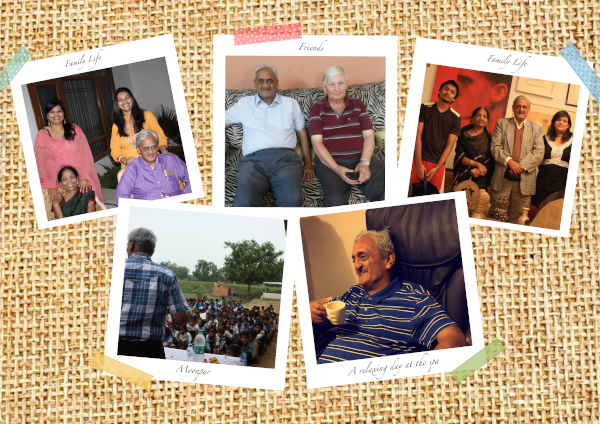
P. C. Mathur: a medley of memories
Subodh Mathur, younger brother
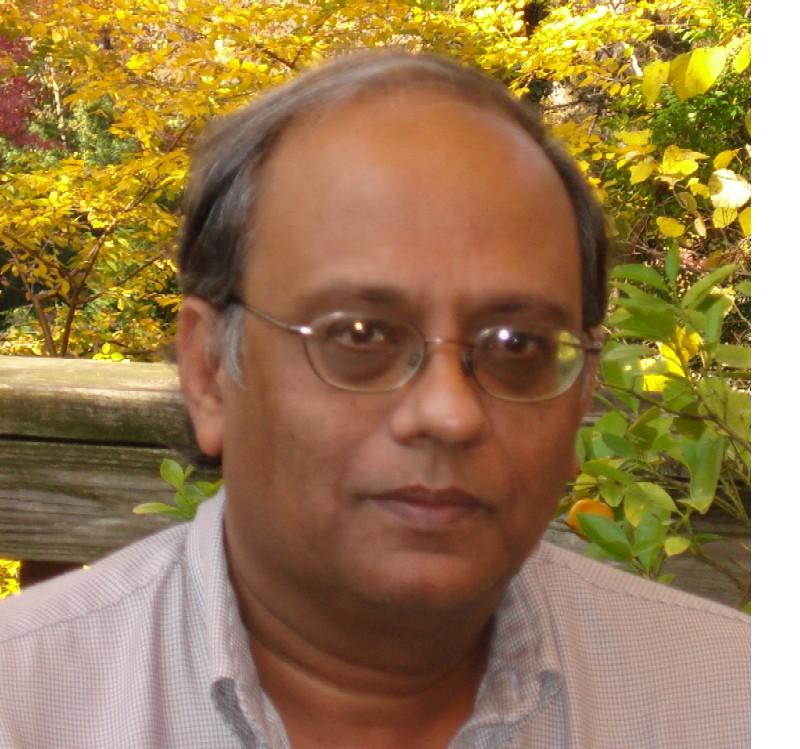
Subodh Mathur was born in Alwar, and educated in Jaipur, Delhi, and Cambridge, USA. He taught economics for one year at Rajasthan University, Jaipur. He has been an independent consultant since 1988, occasionally teaching Economics at the American University, Washington, DC. He lives with his wife, Anuradha Deolalikar in a suburb of Washington, D.C. In his spare time, he is an avid gardener, and the editor of www.indiaofthepast.org.
Bhai Saheb
Bhai Saheb. Respected older brother. That’s what we, his siblings (and our wives) began to call him – he was the oldest –as we settled into our jobs. (When we were younger, in a fit of modernity, we called him by his family nickname Titi). Because he had truly earned our respect, as he showed us the path to success by the type of person he was. Erudite, loving, gentle, generous.
His cleft-palate birth defect did hold him back – but not much. It was difficult to understand what he was saying. But, still, ‘PC’, as his colleagues called him, talked often to professors in many of Rajasthan University’s academic departments. They learned to understand him because they knew he had something to offer– even outside his own field of study.
Senior students and younger faculty kept coming to him for ideas and guidance long after he officially retired from the University. And, he continued to be invited as guest speaker at academic conferences all over India.
His forceful voice is gone. But, the family continues to be guided by the example he set for us.
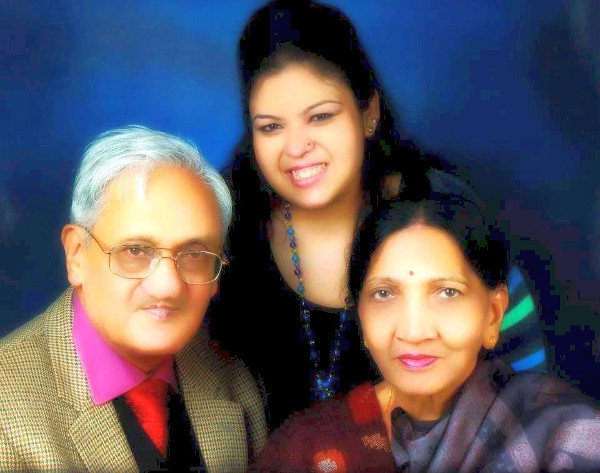
P. C. Mathur, his daughter Sfoorti, and his wife Shashi. Jaipur.
Parul Mathur, niece

Parul Mathur was born in Jaipur. She is a post-graduate in chemistry. Her interests lie in gardening, origami and computer programming.
Titi tauji
Titi Tauji occupies a very special place in my mind. After his passing away, I miss him very much and think about him nearly every day. I reflect on how he lived his life and what lessons I can derive from it.
He loved to read widely, and having read, loved to share his knowledge widely. His favourite thing to gift his family members was a book, signed on the first page and dated with the occasion, like a birthday. The only birthday gift he was prepared to accept happily was stationery because that aided him in his other great love, writing.
He was a prolific writer. He wrote profusely on his favourite academic topics and never failed to distribute copies to whoever met him. He wrote as he spoke - long sentences that ran into a full page size. Almost like Dickens! He came in for heavy criticism from his father for this style of writing but that did not deter him. Once he acquired a personal computer in the early 2000s, he was able to type his work electronically and email it out, allowing his devoted younger brother, Subodh, to edit it.
He was a great talker. No sooner than he spotted you in his orbit, he would pull you into it with the magnetism of his words. In the beginning, the words would sound jumbled up but 5 minutes later, they would magically sort themselves out and start making sense. You would find yourself sitting next to him for hours, spellbound at the river of knowledge tumbled out of him.
He was a newshound. Every newspaper that was published in Jaipur was delivered at our house - English or Hindi, national or regional. Titi tauji would devour the news and by the time the sleepyheads woke up, he was in a position to fully bring us up to speed.
After he got wired up to the Internet, he would send out daily emails to family members scattered all over the world, putting forth his opinions on the hot-button issues of the day, and inviting a full and frank discussion.
He had a great memory. He could form connections to things he had read years’ ago to explain recent happenings that looked puzzling at first.
He had great love for his family members and made time for everyone. When we would visit, he would drape himself in a ‘razai’ on the lounge in the drawing room and talk to us. He would take us for a daily walk to the Rajasthan University campus.
He had great love for the garden that his father had lovingly created at our home in Jaipur. He would stand for hours, watering it thoroughly, front and back, twice a day as soon as there was water supply.
He had great love for his students. He would meet them at our home, either in the front lawn or the back, and spend many evenings discussing their doctoral thesis. We children just enjoyed the chai-samosa, not understanding a word of the political science jargon.
He had great love for the postal service. There was a post office on the University campus. Whenever a first-day postal cover was published, he would buy one for himself, and frequently one for me, too. Thanks to Shashi taiji, who remembered every birthday and anniversary (quite something in a large family of 8 siblings, their spouses and their 14 children), he never failed to mail out a hand-written greeting card.
Thanks to him, I grew a love for stamps and greeting cards. I still possess my stamp albums from my youth. I have also carefully preserved all the first-day covers that Titi tauji ever sent me. I still go to the post office regularly to buy new stamps. When I got married, I discovered that my in-laws also loved greeting cards, so I took over the duties from my husband in sending them out to my in-laws on all their birthdays and anniversaries.
Titi tauji had no love for money. My mother tells me that as an unmarried youth, he once got upset that his mother did not have a proper saree to wear. He went to Bapu Bazaar to buy a new saree. At the shop, he handed the lady a large bill (I think twenty rupees - quite a lot for those days) and requested her to choose an ordinary cotton "dhoti". She handed over a saree with a large chunk of change.
Taken aback, he refused to take the change, saying that he had already decided to spend that money and had no further use for it. The shop lady gently told him that so much money would buy a lot of sarees. He just stood there. Sensing that he was unmoved by her argument, she thought for a moment and then gave him a large bundle of sarees worth twenty rupees. No doubt, when he returned home with the bundle under his arm, my grandmother was both bewildered and bemused.
He would travel by public transport even later in life. Once in a small commuter bus in Jaipur, he handed over a two-rupee note to the conductor as his passage fare. The conductor at once objected to the note, pointing out that it was substantially torn in the middle and so had no monetary value. Titi tauji immediately tore the note into two pieces and threw them in the air. There was a scramble among his fellow travelers and the melee ended with two youth holding one half of the note each. Titi Tauji turned to the conductor with a triumphant smile on his face, as if to say, "If the whole note did not have any value, why would people fight over half a note?"
Titi Tauji had no interest in sophisticated methods of money making, like stock market investments, mutual funds, et al. He preferred to put his earnings in an ordinary savings bank account and leave them there.
He had no love for material things. He spent the vast majority of his adult life in a small bedroom suite adjacent to his father's room. He bought his first car when he was 60 - a Tata Indica, super mini in size and India's first indigenously developed passenger car.
When our grandfather's house was demolished and the furniture distributed among the family members, he took nothing. Instead, he moved into a bare flat and allowed his daughter, a mere teenager at that time, to choose all the new furnishings.
This brings me to his biggest indulgence in life, his daughter Sfoorti. He was as unconventional in her upbringing as in everything else in his life. When she finished secondary schooling at 18, he did not have a serious conversation with her like other parents, trying to persuade her to follow a conventional career path or setting herself up as a suitable candidate for arranged marriage. Instead, he allowed her to do what she wanted - follow her passion for art and design.
Sfoorti brought a fresh breath of youth and modernity in his life. Whenever I visited their home, it was not uncommon to find Sfoorti emerging from the kitchen, beaming over a chocolate cake that she had baked in the microwave. Stepping forward to take a bite, one might trip over her many cute, furry pets. Sfoorti even persuaded Titi Tauji to trade in his Tata Indica for a more stylish Honda City that she learnt to drive herself.
Titi Tauji, Shashi taiji and Sfoorti enjoyed many trips to the new, air-conditioned malls that opened up in Jaipur, doing trendy new things like sipping mocha in Cafes. They also enjoyed long drives to Gurgaon, once Sfoorti decided to pursue design there.
When Titi Tauji passed way unexpectedly early in life, there was an outpouring of grief from family members, friends in academic circles, and students.
For me personally, the void can never be filled. Whenever I water my garden, I aim for the roots like Titi Tauji taught me (never sprinkle from the top). I think about how the world is developing and wonder, "What would he have said?"
I hear no answer.
Photo Collection #4: Photos from an old family album
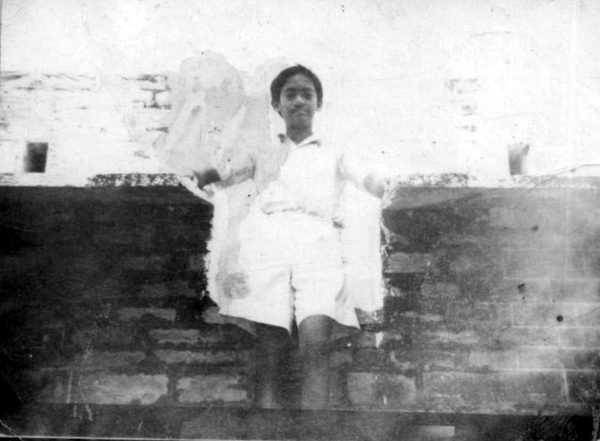
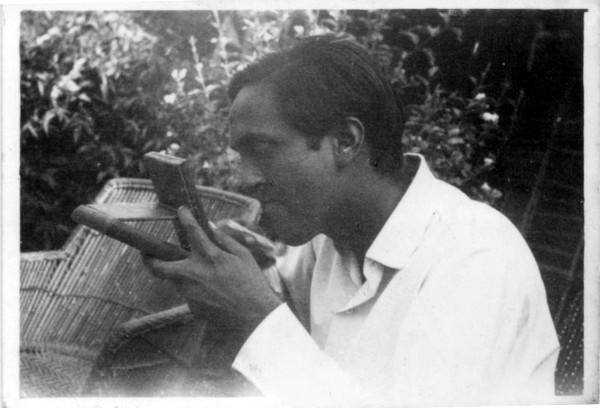
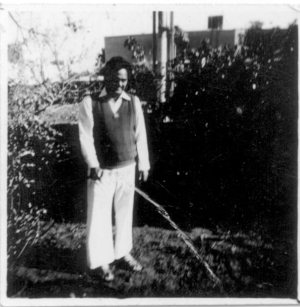
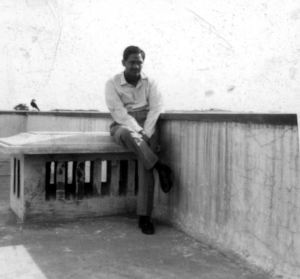
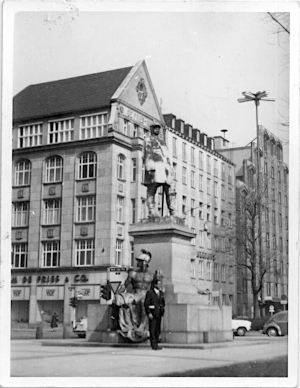
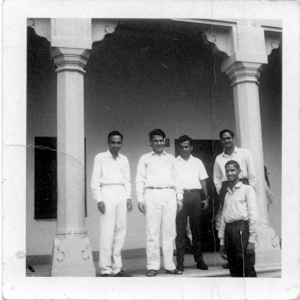
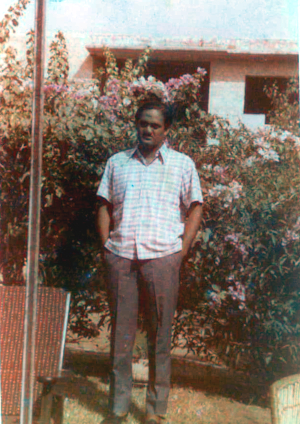
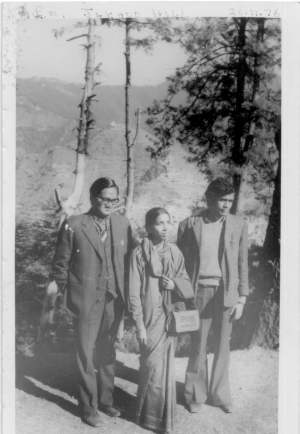
Editor's Note: Here are some more tributes to Shri P. C. Mathur.
- Working with Prof. P. C. Mathur by Alok Mathur
- Tribute to Prof. P. C. Mathur by Naresh Dadhich
- प्रो. पी.सी.माथुर — महान दार्शनिक, चिंतक, दूरदृष्टा, लेखक, एक श्रेष्ठ मित्र और मार्गदर्शक शिक्षक by डाॅ. जनक सिंह मीना
Comments
Excellent
Excellent
Bhai saheb
We miss him but his work lives on.
PC Mathur
Excellent and fitting tribute. A great friend and teacher.
PC Mathur
Your father Khemchandji with your eldest brother
PC Mathur
My personal tribute to PC Sb as he was addressed in Seminars etc He was a true conference man-a remark Shri KL Kamal Former VC R U made in a Seminar at Ajmer by Late Prof.Joshi attended by me also.Shri PC invited me to a few Seminars he organized as Convener of Kota Open University at Jaipur for which he also persuaded me to write a long paper in Hindi on Panchayati Raj. As Editor he published my book reviews and tributes.
His memory is cherish able .
Thanks for sharing his photo with Shri Khem Chandji -a stalwart Administrator of Rajasthan.
·
PC Mathur
hank you for sharing. He used to talk to for long time whenever I visited B 87. I saw sfoorty when she was 8 or 9 months old baby ( may be 1990 or 91). He visited Alwar in 2007 with few family members. Went to Alwar house in Munshi Bazar, Mission School and Jagmohan Niwas ( Tauji's residence as collector alwar). Titi bhai sahab remembered everything. He showed foot ball play ground in school, his room and baithak in jagmohan niwas.
PC Mathur
I went through the writing. Brilliantly portrayed by everyone. The idea of tribute is heart-touching, as writing is the best way to express our feelings. I’m sure he wud have been a great inspiring personality in his days. I’m astound. Great collection of pictures. Happy Birth Anniversary to them! 💐💐
PC Mathur
Great memoirs !
I suppose every one in your large family is so highly & uniquely gifted writer !
Every one has a different style and each one writes like an accomplished author !
All the 7 persons remember 'PC' with so much outpouring of affection ! Each one loves him for what a mesmerizing personality ha was !
I got really moved, while reading all the intimate portraits of your brother Pc , Titi ..!
Oh God, what an outstanding man he would have been !
Thank you so much for sharing
Thank you so much for sharing.
He was a wonderful person although he was so senior to me that my interactions with him were limited. But Ashok often talked about him.
A trip down the memory lane.
Kamal
Add new comment